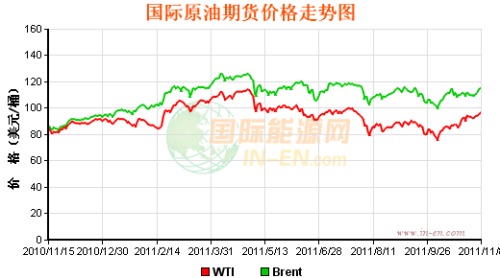 On the morning of November 10th, Beijing time, on Wednesday, Italy’s debt problems caused the market’s escalation of worries over the eurozone’s sovereign debt crisis. The US stock index also fell sharply following the global stock index, oil prices followed lower; although the same day’s inventory data helped crude oil prices A three-month high in the session, the main contract ended the five consecutive trading days of gains and ended the day lower at 95.74 US dollars a barrel.
On the morning of November 10th, Beijing time, on Wednesday, Italy’s debt problems caused the market’s escalation of worries over the eurozone’s sovereign debt crisis. The US stock index also fell sharply following the global stock index, oil prices followed lower; although the same day’s inventory data helped crude oil prices A three-month high in the session, the main contract ended the five consecutive trading days of gains and ended the day lower at 95.74 US dollars a barrel. On the New York Mercantile Exchange, the main crude oil contract for December fell $1.10 on Wednesday, closing at $95.74 a barrel, a decrease of 1.1%.
The US stock index has been regarded as an important indicator of short-term economic prospects and market sentiment, and is also a barometer of demand for energy products to some extent. For most of the past two years, oil prices have closely followed the trend of the US stock index.
On Wednesday, Italy’s 10-year benchmark bond yields surged to a key position that exceeded 7%, entering the market generally considered unsustainable. Investors are generally concerned that the third largest economy in the euro zone may need some kind of external aid. Compared with Greece, Ireland and Portugal, the scale of the Italian economy obviously will make the cost of assistance too high, or even impossible to be effectively aided.
The Italian Prime Minister Silvio Berlusconi has finally agreed to resign after receiving the approval of the new budget 20 years after he took office, and said that he will not participate in the subsequent election. Matt Smith, an analyst at Kentucky-based trader Samet Energy, pointed out that "the market's concern about Italian debt defaults continues to weigh on the market's risk preferences and various asset classes have been sold off." European banks have used the European Central Bank’s overnight emergency liquidity window to gain access to investors, adding to investors’ concerns about the health of the European financial system.
Global stocks all fell sharply on Wednesday, the European shares index fell 1.7%, France, Germany and the British three major stock indexes fell by about 2%. In the US stock market, the Dow Jones Industrial Average lost more than 3.2% at the close of the crude oil market.
The U.S. Department of Energy’s Energy Information Administration released a routine inventory report on Wednesday, showing that in the week ending November 4th, U.S. crude oil inventories fell by 1.4 million barrels, and the market survey showed that crude oil inventories increased by 1 million barrels. Analysts’ average expectations run counter to it. Crude oil prices have risen higher in this favourable support.
The Energy Information Administration report also pointed out that gasoline inventories fell by 2.1 million barrels last week, and distillate stocks, including diesel and distillate fuel oil, fell by 6 million barrels. Previous market surveys showed that analysts generally expect gasoline inventory to decline by 400,000 barrels and distillate stocks to decrease by 2.5 million barrels during the week ending November 4.
Affected by the inventory report, the December formula gasoline contract price fell 6 cents on Wednesday to close at 2.64 US dollars per gallon, a decrease of 2.3%; December distillates fell 2 cents to 3.10 US dollars per gallon, a decrease of 0.6%.
The Energy Energy Administration of the Ministry of Energy will also release the data on natural gas inventories last week. The December natural gas contract fell 9 cents on Wednesday to $3.65 per million British thermal units, a decrease of 2.4%.
Steel Grating,Miscellaneous Co., Ltd. , http://www.steel-grating-manufacturer.com